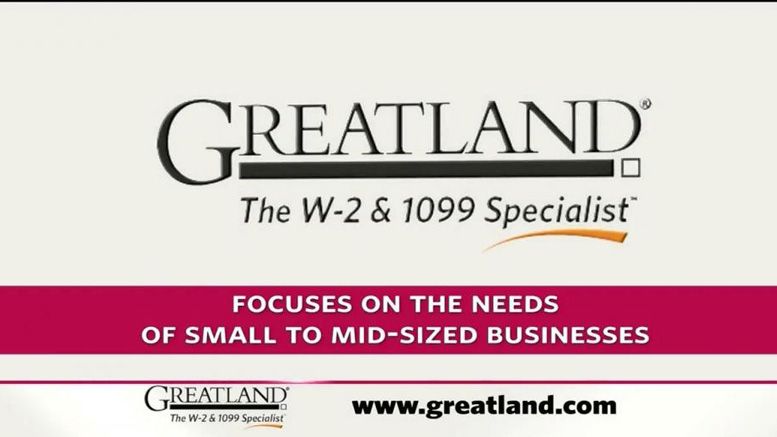
Greatland Helps Businesses Navigate Reporting Changes for W-2 and 1099 Forms
Annual tax reporting changes are inevitable; however, this year brings a major new series of filing responsibilities for employers and businesses due to the Affordable Care Act (ACA).
Along with the yearly adjustments mandated by the Internal Revenue Service related to W-2 and 1099 forms, brand new 1095 forms have been added to the list of required forms for filers this year.
To accurately navigate all of the important changes this reporting season, Greatland Corporation, one of the country's leading providers of W-2 and 1099 products for businesses and an expert resource for ACA information, has compiled a list of what businesses need to be aware of when filing this year.
2015 Affordable Care Act Forms Required for 2015 Reporting
Under ACA, or Obamacare, all providers of healthcare, including employers that provide self-insured coverage, must file returns with the IRS that include information about the coverage and each covered individual.
Employers should report this information on Forms 1095-B or 1095-C, depending on the size of the employer. Providing 1095 forms became mandatory starting in the 2015 tax year and filers must send the forms not only to their eligible recipients but also to the IRS in order to remain in compliance with ACA reporting requirements. Filers with 250 or more forms must file them electronically. Incorrect filings will not be penalized for calendar year 2015 filing (reported in 2016) if employers/insurers file on time and make a good faith effort to comply. Below is a summary of each new form related to the Affordable Care Act:
- Form 1095-B—Health Coverage
Insurers and self-insured employers that provide health plans are required to report data on all covered individuals. - Form 1094-B—Transmittal of Health Coverage Information Returns
Form 1094-B is the transmittal for Form 1095-B. - Form 1095-C—Employer-Provided Health Insurance Offer and Coverage
Employers with 50 or more full-time employees (including full-time equivalent employees) are required to report (whether or not they offered coverage to their employees) by providing each full-time employee with Form 1095-C. This form requires information such as whether the employee was offered coverage, for which months, and the employee's share of the lowest-cost monthly premium for self-only minimum value coverage. A large employer with a self-insured plan will only be required to submit Form 1095-C, as the information on Form 1095-B can be included on Form 1095-C. - Form 1094-C—Transmittal of Employer-Provided Health Insurance offer and Coverage Information Returns
2015 W-2 Form Changes
Medicaid Waiver Payments
Certain Medicaid waiver payments are excludable from income for federal income tax purposes. See Notice 2014-7 for additional information.
Third-party Sick Pay Recap Reporting
For wages paid in 2015, Form 8922, Third-Party Sick Pay Recap, will be used to report total third-party sick pay wages paid to employees when liability for the employer and the employee portions of Federal Insurance Contributions Act (FICA) taxes on the wages is split between the employer for whom services are normally rendered and the third-party payer. Form 8922 replaces the Third-Party Sick Pay Recap Form W-2 and W-3. Form 8922 is filed with the IRS rather than the SSA.
Virtual Currency
The fair market value of virtual currency (such as Bitcoin) paid as wages is subject to federal income tax withholding, FICA tax and Federal Unemployment Tax Act (FUTA) tax and must be reported on Form W-2.
1099 and Related Form Changes
1096 - Compilation sheet that shows the totals of the information returns that you are physically mailing to the IRS. The check box for Form 1099-H was removed from line 6, while a check box for Form 1098-Q was added to line 6. The spacing for all check boxes on line 6 was expanded. The amounts reported in Box 13 of Form 1099-INT should now be included in box 5 of Form 1096 when filing Form 1099-INT to the IRS.
1098-C – This form is for contributions of motor vehicles, boats, and airplanes. A donee organization must file a separate Form 1098-C with the IRS for each contribution of a qualified vehicle that has a claimed value of more than $500. All filers of this form may truncate a donor's identification number (social security number, individual taxpayer identification number, adoption taxpayer identification number, or employer identification number), on written acknowledgements. Truncation is not allowed, however, on any documents the filer files with the IRS.
1099-B – This form is issued by a broker or barter exchange that summarizes the proceeds of transactions. For a sale of debt instrument that is a wash sale and has accrued market discount, enter code "W" in box 1f and the amount of the wash sale loss disallowed in box 1g.
1099-DIV – This form is issued to those who have received dividends from stocks. A new check box was added to this form to identify a foreign financial institution filing this form to satisfy its chapter 4 reporting requirement.
1099-INT – This form is used to report interest income from banks and other financial institutions. Box 13 was added to report bond premium on tax-exempt bonds. All later boxes were renumbered. A new check box was added to this form to identify a foreign financial institution filing this form to satisfy its chapter 4 reporting requirement.
1099-K – This form is given to those merchants accepting payment card transactions. Completion of box 1b (Card Not Present transactions) is now mandatory for 2015.
1099-MISC – This form reports the total paid during the year to a single person or entity for services provided. Certain Medicaid waiver payments may be excludable from the income as difficulty of care payments. A new check box was added to this form to identify a foreign financial institution filing this form to satisfy its chapter 4 reporting requirement.
Important Dates To Remember
- February 1, 2016 – due date to mail recipient copies for W-2,1099, & 1095
- February 29, 2016 – due date to send paper format of 1099 & 1095 Federal (IRS) filing
- February 29, 2016 – due date to send paper format of W-2 Federal (SSA) filing
- or
- March 31, 2016 – due date to send e-file format of W-2, 1099, & 1095 Federal (SSA/IRS) filing
- Form 1095 does not need to be filed at the state level
About Greatland
Greatland (www.greatland.com) is the W-2 and 1099 specialist, focused on providing information, products, and solutions for small to mid-size businesses and accountants. Greatland helps customers navigate annual reporting changes, including extensive expertise about ACA reporting. Through Greatland's subsidiaries – Greatland, Nelco, and Broker Forms – the company offers an extensive array of specialized products for businesses: W-2 forms, 1099 forms, 1095 forms, W-2 and 1099 software, online filing, business checks, presentation materials, income tax preparation supplies, and mortgage forms. Greatland also offers Yearli, a comprehensive W-2 and 1099 reporting software and online filing platform. Greatland is an employee-owned company with locations in Grand Rapids, Mich. and Green Bay, Wis.
Greatland has an extensive W-2 & 1099 fact center located on its website http://www.greatland.com/ with answers to many of the top filing questions.
Follow us on Facebook or Twitter: @GreatlandCorp
Related News





